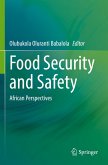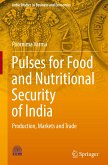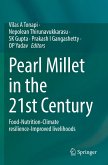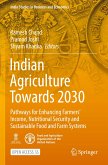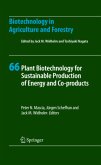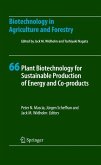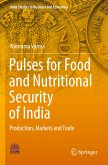Food Security and Safety
African Perspectives
Herausgegeben:BABALOLA, OLUBUKOLA OLURANTI
Food Security and Safety
African Perspectives
Herausgegeben:BABALOLA, OLUBUKOLA OLURANTI
- Gebundenes Buch
- Merkliste
- Auf die Merkliste
- Bewerten Bewerten
- Teilen
- Produkt teilen
- Produkterinnerung
- Produkterinnerung
This book focuses on food security and safety issues in Africa, a continent presently challenged with malnutrition and food insecurity. The continuous increase in the human population of Africa will lead to higher food demands, and climate change has already affected food production in most parts of Africa, resulting in drought, reduced crop yields, and loss of livestock and income. For Africa to be food-secure, safe and nutritious food has to be available, well-distributed, and sufficient to meet people's food requirements. Contributors to Food Security and Safety: African Perspectives offer…mehr
Andere Kunden interessierten sich auch für
![Food Security and Safety Food Security and Safety]() Food Security and Safety216,99 €
Food Security and Safety216,99 €![Pulses for Food and Nutritional Security of India Pulses for Food and Nutritional Security of India]() Poornima VarmaPulses for Food and Nutritional Security of India100,99 €
Poornima VarmaPulses for Food and Nutritional Security of India100,99 €![Pearl Millet in the 21st Century Pearl Millet in the 21st Century]() Pearl Millet in the 21st Century202,99 €
Pearl Millet in the 21st Century202,99 €![Indian Agriculture Towards 2030 Indian Agriculture Towards 2030]() Indian Agriculture Towards 203031,99 €
Indian Agriculture Towards 203031,99 €![Plant Biotechnology for Sustainable Production of Energy and Co-products Plant Biotechnology for Sustainable Production of Energy and Co-products]() Plant Biotechnology for Sustainable Production of Energy and Co-products116,99 €
Plant Biotechnology for Sustainable Production of Energy and Co-products116,99 €![Plant Biotechnology for Sustainable Production of Energy and Co-products Plant Biotechnology for Sustainable Production of Energy and Co-products]() Plant Biotechnology for Sustainable Production of Energy and Co-products116,99 €
Plant Biotechnology for Sustainable Production of Energy and Co-products116,99 €![Pulses for Food and Nutritional Security of India Pulses for Food and Nutritional Security of India]() Poornima VarmaPulses for Food and Nutritional Security of India100,99 €
Poornima VarmaPulses for Food and Nutritional Security of India100,99 €-
-
-
This book focuses on food security and safety issues in Africa, a continent presently challenged with malnutrition and food insecurity. The continuous increase in the human population of Africa will lead to higher food demands, and climate change has already affected food production in most parts of Africa, resulting in drought, reduced crop yields, and loss of livestock and income. For Africa to be food-secure, safe and nutritious food has to be available, well-distributed, and sufficient to meet people's food requirements.
Contributors to Food Security and Safety: African Perspectives offer solutions to the lack of adequate safe and nutritious food in sub-Saharan Africa, as well as highlight the positive efforts being made to address this lack through a holistic approach. The book discusses the various methods used to enhance food security, such as food fortification, fermentation, genetic modification, and plant breeding for improved yield and resistance to diseases. Authors emphasize the importance of hygiene and food safety in food preparation and preservation, and address how the constraints of climate change could be overcome using smart crops.
As a comprehensive reference text, Food Security and Safety: African Perspectives seeks to address challenges specific to the African continent while enhancing the global knowledge base around food security, food safety, and food production in an era of rapid climate change.
Contributors to Food Security and Safety: African Perspectives offer solutions to the lack of adequate safe and nutritious food in sub-Saharan Africa, as well as highlight the positive efforts being made to address this lack through a holistic approach. The book discusses the various methods used to enhance food security, such as food fortification, fermentation, genetic modification, and plant breeding for improved yield and resistance to diseases. Authors emphasize the importance of hygiene and food safety in food preparation and preservation, and address how the constraints of climate change could be overcome using smart crops.
As a comprehensive reference text, Food Security and Safety: African Perspectives seeks to address challenges specific to the African continent while enhancing the global knowledge base around food security, food safety, and food production in an era of rapid climate change.
Produktdetails
- Produktdetails
- Verlag: Springer / Springer International Publishing / Springer, Berlin
- Artikelnr. des Verlages: 978-3-030-50671-1
- 1st edition 2021
- Seitenzahl: 956
- Erscheinungstermin: 2. September 2021
- Englisch
- Abmessung: 241mm x 160mm x 57mm
- Gewicht: 1521g
- ISBN-13: 9783030506711
- ISBN-10: 3030506711
- Artikelnr.: 59432713
- Herstellerkennzeichnung Die Herstellerinformationen sind derzeit nicht verfügbar.
- Verlag: Springer / Springer International Publishing / Springer, Berlin
- Artikelnr. des Verlages: 978-3-030-50671-1
- 1st edition 2021
- Seitenzahl: 956
- Erscheinungstermin: 2. September 2021
- Englisch
- Abmessung: 241mm x 160mm x 57mm
- Gewicht: 1521g
- ISBN-13: 9783030506711
- ISBN-10: 3030506711
- Artikelnr.: 59432713
- Herstellerkennzeichnung Die Herstellerinformationen sind derzeit nicht verfügbar.
Professor Olubukola Oluranti Babalola (Pr.Sci.Nat, MASSAF) is the Vice President of the Organization for Women in Science for the Developing World, and a National Research Foundation rated established, scientist. She received her PhD (Microbiology) in 2000 from the University of Ibadan and completed an MBA in Science Leadership from the North-West University (NWU) School of Business. She is a product of the International Institute of Tropical Agriculture and had postdoctoral experiences from Weizmann Institute of Science, Israel, and the University of the Western Cape, South Africa. She is the Research Director of Food Security and Safety at NWU and previous Head of Biology Department and without reservation leading, as the Principal Investigator, a Microbial Biotechnology laboratory. Olubukola is a trainer of trainees; she leads a research team of over a dozen scholars from different tribes and tongues. Her laboratory is a mini united nation, with students from within and outside Africa. She has graduated 14 PhDs, 16 masters, and 48 Honors students. Olubukola's areas of research interest are Molecular Plant-Microbe Interactions, Soil Metagenomics, Food Security, and Microbial Ecology. She enjoys international collaborations, research grants, and many awards. Olubukola is a prolific author with ~200 publications. She has over 40 professional certificates from the University of California, Berkeley, USA; University of Mauritius, Reduit; NWU, South Africa, and Bradford University, the UK, to mention a few. Her wealth of international experience spans through the Americas, Asia, Europe, and Oceania.
1. Harnessing the Hidden Treasures in African Yam Bean (Sphenostylis stenocarpa), An Underutilized Grain Legume with Food Security Potentials.- 2. The Role of Indigenous Food Species in Achieving Food Security in South-Eastern Nigeria.- 3. The potentials of African neglected and orphan crops in augmentation of African food security.- 4. Optimization of Soaking Condition and Drying Temperature for The Production of African Yam Beans (Sphenostylis sternocarpa) Flour.- 5. Harnessing the Potential of Underutilized Aquatic Bioresource For Food and Nutritional Security in Kenya.- 6. Exploring Some Neglected and Underutilized Root and Tuber Crops for Food Security in Nigeria.- 7. Finger Millet: A Crop with Food Security Potentials for Africans.- 8. An Exploratory Study of The Association Among Household Food Securing Activities, Gender and Health in South Africa.- 9. Exploring the Industrial Potential of The Nigerian Pumpkins (Cucurbita pepo L.).- 10. Functional Meat andMeat Products for Sustainable African Nutrition Security.- 11. Agricultural Productivity: A Key Component of Inclusive Growth Towards Food Security.- 12. Optimal Formulation of a Composite Flour from Biofortified Cassava, Pigeonpea, and Soybean for Complementary Feeding.- 13. Gauging Food Insecurity Resilience Among Pastoral Communities: A Case Study of Kenya.- 14. Optimisation and Multiplication of Large Fulani Eco-Type Chicken for Sustainable Production and Genetic Security in Nigeria.- 15. Soil Quality Indicators; Their correlation and Role in Enhancing Agricultural Productivity.- 16. Soil Quality and Horticulture: Implication for Food Security and Safety in Nigeria.- 17. Beneficiation of castor and thorn trees as management strategy to food security.- 18. Soil Information as A Factor to Consider in Sustainable Tree Crop Production for Nutritional Security, Poverty Alleviation and Biodiversity Management in Africa.- 19. African Walnuts: A Natural Depository of Nutritional and Bioactive Compounds Essential for Food and Nutritional Security in Africa.- 20. Implications of Production, Post-harvest and Consumption of Fish on Food and Nutrition Security: Nigeria as a Focal Country.- 21. Improving Crop Physio-Biochemical Efficiency and Abiotic Resilient Crops for Alleviating Food Insecurity in Africa.- 22. Analysis of Cassava Farmers' Response to Climate Change Adaptation: Implication for Sustainable Food Production in Nigeria.- 23. Sustainable Agriculture: A Way Out to Combat Food Insecurity and Unsafety in The Context of Climate Change in West Africa.- 24. Smart Crops for Climate Change and Food Security in Africa.- 25. Impact of Climate Change and Climate Variability on Food Safety and Occurrence of Foodborne Diseases.- 26. Management of Soil-Microorganism: Interphase for Sustainable Soil Fertility Management and Enhanced Food Security.- 27. The Relevance of Plant Breeding to Food Security in Africa.- 28. Extent, Impact and Prospects of Genetically Engineered Cropsin Africa.- 29. Soil Microbes and Food Security Nexus: Imperativeness of Microbial Biotechnology.- 30. Production of Edible Oil from Microorganisms.- 31. Food Sustainability Enhancement: Plant Growth-Promoting Bacteria as Key Players in The Alleviation of Drought Stress in Plants.- 32. Molecular Markers: Potential Facilitators in Plant Breeding and Germplasm Conservation.- 33. Biofertilizer: An Eco-Friendly Approach for Sustainable Crop Production.- 34. Design and Development of a Hybrid Bio-Solar Energy Fruit Dryer.- 35. Advances in Extrusion Technology and Its Applicability to Food Processing in Developing Nations.- 36. Nanotechnology as Vehicle for Biocontrol of Plant Diseases in Crop Production.- 37. Fusarium Species and Their Associated Mycotoxins in Foods and Their Products In Africa.- 38. Application of Nanobiotechnology In Agri-Food Sector; A Promising Technique in Food Safety.- 39. Salmonella enterica Subspecies Enterica Serotypes Associated with Meat and Meat Products in African Countries: A Review.- 40. Heavy Metals Contamination of Arable Lands: A Threat to Food Security and Safety.- 41. A Step Forward Towards Food Safety from Parasite Infective Agents.- 42. African Fermented Food as Antimicrobial Agents.- 43. Risk Assessment of Human Carcinogenicity of Acrylamide in Food: Way to Reduce the Predicted Mitogenic Side Effects Through Mitigation Strategy.- 44. Safety Hazards Along Animal Food Supply Chain in Nigeria.
1. Harnessing the Hidden Treasures in African Yam Bean (Sphenostylis stenocarpa), An Underutilized Grain Legume with Food Security Potentials.- 2. The Role of Indigenous Food Species in Achieving Food Security in South-Eastern Nigeria.- 3. The potentials of African neglected and orphan crops in augmentation of African food security.- 4. Optimization of Soaking Condition and Drying Temperature for The Production of African Yam Beans (Sphenostylis sternocarpa) Flour.- 5. Harnessing the Potential of Underutilized Aquatic Bioresource For Food and Nutritional Security in Kenya.- 6. Exploring Some Neglected and Underutilized Root and Tuber Crops for Food Security in Nigeria.- 7. Finger Millet: A Crop with Food Security Potentials for Africans.- 8. An Exploratory Study of The Association Among Household Food Securing Activities, Gender and Health in South Africa.- 9. Exploring the Industrial Potential of The Nigerian Pumpkins (Cucurbita pepo L.).- 10. Functional Meat andMeat Products for Sustainable African Nutrition Security.- 11. Agricultural Productivity: A Key Component of Inclusive Growth Towards Food Security.- 12. Optimal Formulation of a Composite Flour from Biofortified Cassava, Pigeonpea, and Soybean for Complementary Feeding.- 13. Gauging Food Insecurity Resilience Among Pastoral Communities: A Case Study of Kenya.- 14. Optimisation and Multiplication of Large Fulani Eco-Type Chicken for Sustainable Production and Genetic Security in Nigeria.- 15. Soil Quality Indicators; Their correlation and Role in Enhancing Agricultural Productivity.- 16. Soil Quality and Horticulture: Implication for Food Security and Safety in Nigeria.- 17. Beneficiation of castor and thorn trees as management strategy to food security.- 18. Soil Information as A Factor to Consider in Sustainable Tree Crop Production for Nutritional Security, Poverty Alleviation and Biodiversity Management in Africa.- 19. African Walnuts: A Natural Depository of Nutritional and Bioactive Compounds Essential for Food and Nutritional Security in Africa.- 20. Implications of Production, Post-harvest and Consumption of Fish on Food and Nutrition Security: Nigeria as a Focal Country.- 21. Improving Crop Physio-Biochemical Efficiency and Abiotic Resilient Crops for Alleviating Food Insecurity in Africa.- 22. Analysis of Cassava Farmers' Response to Climate Change Adaptation: Implication for Sustainable Food Production in Nigeria.- 23. Sustainable Agriculture: A Way Out to Combat Food Insecurity and Unsafety in The Context of Climate Change in West Africa.- 24. Smart Crops for Climate Change and Food Security in Africa.- 25. Impact of Climate Change and Climate Variability on Food Safety and Occurrence of Foodborne Diseases.- 26. Management of Soil-Microorganism: Interphase for Sustainable Soil Fertility Management and Enhanced Food Security.- 27. The Relevance of Plant Breeding to Food Security in Africa.- 28. Extent, Impact and Prospects of Genetically Engineered Cropsin Africa.- 29. Soil Microbes and Food Security Nexus: Imperativeness of Microbial Biotechnology.- 30. Production of Edible Oil from Microorganisms.- 31. Food Sustainability Enhancement: Plant Growth-Promoting Bacteria as Key Players in The Alleviation of Drought Stress in Plants.- 32. Molecular Markers: Potential Facilitators in Plant Breeding and Germplasm Conservation.- 33. Biofertilizer: An Eco-Friendly Approach for Sustainable Crop Production.- 34. Design and Development of a Hybrid Bio-Solar Energy Fruit Dryer.- 35. Advances in Extrusion Technology and Its Applicability to Food Processing in Developing Nations.- 36. Nanotechnology as Vehicle for Biocontrol of Plant Diseases in Crop Production.- 37. Fusarium Species and Their Associated Mycotoxins in Foods and Their Products In Africa.- 38. Application of Nanobiotechnology In Agri-Food Sector; A Promising Technique in Food Safety.- 39. Salmonella enterica Subspecies Enterica Serotypes Associated with Meat and Meat Products in African Countries: A Review.- 40. Heavy Metals Contamination of Arable Lands: A Threat to Food Security and Safety.- 41. A Step Forward Towards Food Safety from Parasite Infective Agents.- 42. African Fermented Food as Antimicrobial Agents.- 43. Risk Assessment of Human Carcinogenicity of Acrylamide in Food: Way to Reduce the Predicted Mitogenic Side Effects Through Mitigation Strategy.- 44. Safety Hazards Along Animal Food Supply Chain in Nigeria.


